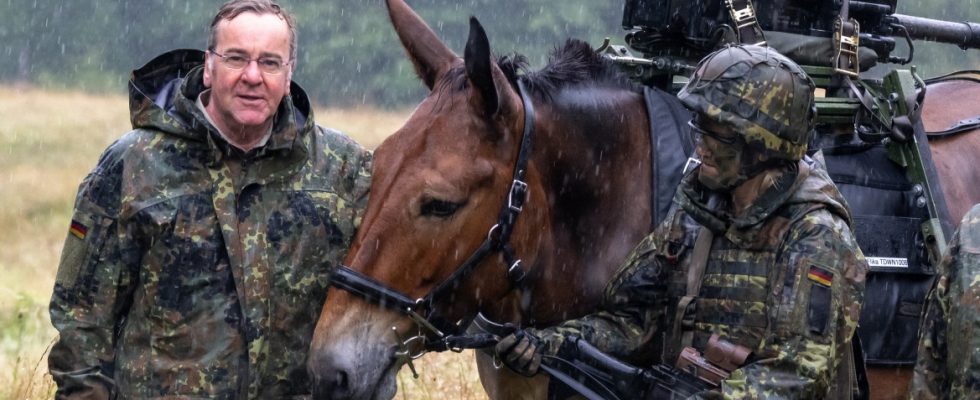Boris Pistorius is currently on the road a lot. The Minister of Defense visits the elite fighters of the Special Forces Command (KSK) as well as the Mountain Infantry Brigade 23 in Bad Reichenhall. On Wednesday, Pistorius also used a visit to a Bundeswehr career center in Stuttgart to question the personnel target of 203,000 soldiers for 2031. He gives the reasons baby boomers and the shortage of skilled workers.
Since Pistorius has only been in office since January, he can initiate such debates – after all, his predecessors had made the corresponding plans. Pistorius also emphasized early Thursday evening at IG Metall in Munich that he does many things differently than Christine Lambrecht (SPD) or Annegret Kramp-Karrenbauer (CDU). “I’m the first defense minister to seek contact with the armaments industry again,” he said before a meeting with the works councils of KNDS, RUAG Aerospace Structures, Airbus and Hensoldt. He is doing this “out of conviction,” because for the success of the new era proclaimed by Chancellor Olaf Scholz, all players must be involved – including the manufacturers of ammunition, sensors and tanks.
According to the head of the SPD parliamentary group in the Bavarian state parliament, 25,000 to 30,000 people work in the “military technology industry” in Bavaria alone. Florian von Brunn is also the top candidate for the state elections and should of course be happy about the appointment with Pistorius in view of the poor poll numbers, after all he is him currently most popular politicians in Germany. Pistorius emphasizes that there is still “a long way” to a functioning and deterrent army. The armaments industry must now make up for “what could not be produced before” because the governments in Berlin did not ask for it. The works councils should like the fact that Pistorius certifies Bavaria as a location of “very special importance” for the turn of the century. The fact that the image of their industry has improved also helps when looking for trainees and skilled workers. In addition to engineers, welders are also in demand.
Pistorius during an interview at the Bundeswehr Career Center in Stuttgart.
(Photo: Marijan Murat/dpa)
Works council chairman Hubert Otto describes the mood among the employees of Europe’s largest tank builder KNDS, a German-French joint venture: “Our jobs have become a lot safer as a result.” Otto speaks for the 1,700 employees of Krauss-Maffei Wegmann (KMW), who produce the coveted battle tanks leopard 2 produce, and he has specific demands. Politicians must make “reliable statements” about which and how many vehicles and systems are needed so that companies can plan. The approval of the test track at the Munich-Allach location, where the tanks are presented and checked for customers such as the German Armed Forces, is of the utmost importance. “That’s why we’re asking those responsible to conclude the process positively for us and to secure our jobs,” calls Otto to applause from the trade unionists.
The defense minister is also happy about the increased appreciation in the armaments industry
Pistorius makes it clear that the Bundeswehr also wants timely approval. A citizens’ initiative called “School instead of tanks” is protesting against this permit.. He is in contact with Munich Mayor Dieter Reiter. Conveniently, he also belongs to the SPD, and Reiter knows for certain that KMW is threatening to cut around 500 jobs if the test track is banned. Actually, they want to hire “50 to 100 employees per year” in Allach for the next five yearssaid KMW boss Ralf Ketzel recently Munich Mercury – but for that you need the test track.
Michael Richter’s appeal is even more urgent. The head of the works council at Ruag Aerospace Structures demands “political support” from Pistorius so that Airbus does not cut jobs in Oberpfaffenhofen, because assemblies are to be relocated to other locations. IG Metall is also fighting for these 750 jobs. For the union, Stefanie Krammer demands that the defense budget must also secure “good, collectively agreed jobs” – and not just at large companies. RUAG works council judge announces that he will appeal to Pistorius for Oberpfaffenhofen to be considered for government contracts.
Of course, political professional Pistorius does not comment on this before the non-public discussion. He emphasizes that he is pleased that, in addition to the soldiers, the employees of the armaments industry are now feeling more appreciation – and assures that there will still be enough money for defense once the special fund has been spent. To his chagrin, this happens fairly quickly: by the end of 2023, around 65 billion euros would be tied up in contracts and preliminary contracts. After that, production begins, which, however, takes longer in the armaments industry than elsewhere. And hardly anyone knows that better than the works councils.

